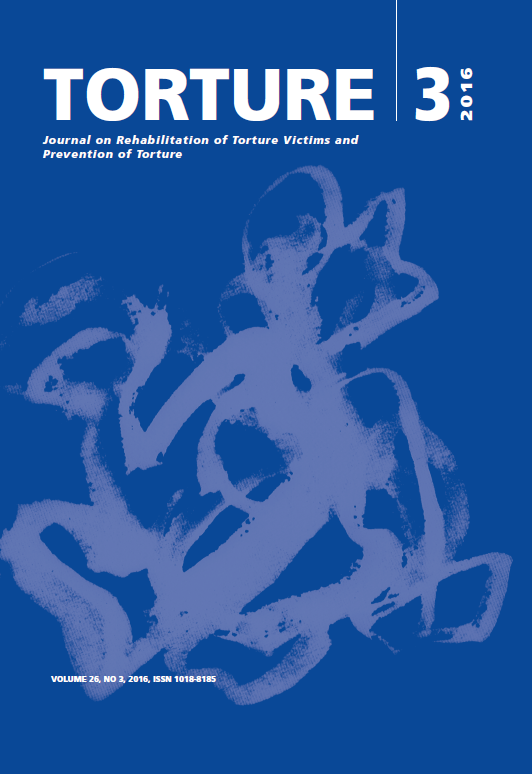Incommunicado detention and torture in Spain, Part IV: Psychological and psychiatric consequences of ill-treatment and torture: trauma and human worldviewsi
DOI:
https://doi.org/10.7146/torture.v26i3.109380Palabras clave:
Psychological torture, incommunicado detention, posttraumatic stress disorder, psychometric test, depressive disorder, ill-treatment, torture, psychological examinationResumen
Background: Most literature on psychological consequences of torture is related to prolonged detention. Psychological consequences of intensive physical and psychological torture in brief detention have not been investigated. The aim of this study is to analyse the psychological impact of torture in short-term incommunicado detention.
Method: A sample of 45 Basque people who had allegedly been subjected to ill-treatment or torture whilst held in incommunicado detention between two and 11 days in Spain in the period 1980-2012 was analysed. The period between detention and evaluation ranged between two and 12 years. Each case was evaluated by several psychiatrists and psychologists. Clinical interviews which followed the Istanbul Protocol were assessed, as were psychometric tests (Post-traumatic Checklist-Civilian version (PCL-C), Beck Depression Inventory (BDI) and Vital Impact Assessment Questionnaire (VIVO)) and external documentary evidence. A cumulative prevalence of psychiatric diagnosis (ICD-10) from the period of detention was established.
Findings. Post-traumatic stress disorder (PTSD) was the most frequent diagnosis (53%). Enduring personality change after a catastrophic experience was detected in 11% of subjects. Other diagnoses were depressive disorders (16%) and anxiety disorders (9%). Psychometric evaluation at the time of the study showed symptoms of PTSD in 52% of the subjects (with a tendency for these symptoms to diminish over time) and depressive symptoms in 56%. The VIVO questionnaire discerned two subgroups of survivors: “affected” survivors (36%); and “resilient” survivors (64%).
Interpretation. The data demonstrated two important issues: the undervalued damaging effect of intensive torture in short-term detention and the long-lasting psychological damage of the same over time.
Citas
2. Simpson M. Traumatic stress and the bruising of the soul: the effects of torture and coercive interrogation. In: Wilson JP, Raphael B, editors. International Handbook of Traumatic Stress Syndromes. New York: Plenum Press; 1993.
3. Petersen HD, Jacobsen P. Life-threatening torture without visible marks. Scand J Public Health. 1985;13:87–8.
4. Basoglu M, Paker M, Paker O, Ozmen E, Marks I, Incesu C, Sahin D, Sarimurat N. Psychological effects of torture: a comparison of tortured with nontortured political activists in Turkey. Am J Psychiatry. 1994;151:76–81.
5. Steel Z, Chey T, Silove D, Marnane C, Bryant RA, Van Ommeren M. Association of torture and other potentially traumatic events with mental health outcomes among populations exposed to mass conflict and displacement: a systematic review and meta-analysis. JAMA. 2009;302:537– 49.
6. Fazel M, Wheeler J, Danesh J. Prevalence of serious mental disorder in 7000 refugees resettled in western countries: a systematic review. The Lancet. 2005;365:1309–14.
7. Johnson H, Thompson A. The development and maintenance of post-traumatic stress disorder (PTSD) in civilian adult survivors of war trauma and torture: A review. Clin Psychol Rev. 2008;28:36–47.
8. Basoglu M, Jaranson J., Mollica RF, Kastrup M. Torture and mental health: A research overview. In: Gerrity E, Keane TM, Tuma R, editors. The mental health consequences of torture. 2001. pp. 35– 62.
9. Bașoğlu M. A multivariate contextual analysis of torture and cruel, inhuman, and degrading treatments: Implications for an evidence-based definition of torture. Am J Orthopsychiatry. 2009; 79:135-145.
10. Weathers FW, Huska JA, Keane TM. The PTSD Checklist-Civilian Version (PCL-C). Boston: National Center for PTSD; 1991.
11. Ruggiero KJ, Del Ben K, Scotti JR, Rabalais AE. Psychometric properties of the PTSD Checklist—Civilian version. J Trauma Stress. 2003;16:495–502.
12. Beck AT, Ward CH, Mendelson M, Mock J, Erbaugh JK. An inventory for measuring depression. Arch Gen Psychiatry. 1961;4:561–71.
13. Beck AT, Steer RA, Carbin MG. Psychometric properties of the Beck Depression Inventory: Twenty-five years of evaluation. Clin Psychol Rev. 1988;8:77–100.
14. Perez Sales P, Eiroa-Orosa FJ, Olivos P, Barbero-Val E, Fernández-Liria A, Vergara M. VIVO Questionnaire. A measure of human worldviews and identity in trauma, crisis and loss. Validation and preliminary findings. Journal of Loss and Trauma; 2012 DOI: 10.1080/15325024.2011.616828.
15. Bașoğlu M, Livanou M, Crnobarić C. Torture vs other cruel, inhuman, and degrading treatment: is the distinction real or apparent? Arch Gen Psychiatry. 2007;64:277–85.
16. Reeler AP. Is torture a post-traumatic stress disorder?. Torture. 1994;4:59–63. 17. Summerfield D. A critique of seven assumptions behind psychological trauma programmes in war-affected areas. Soc Sci Med. 1999;48:1449–62.
Descargas
Publicado
Cómo citar
Número
Sección
Licencia
We accept that some authors (e.g. government employees in some countries) are unable to transfer copyright. The Creative Commons Licence Attribution-NonCommercial-NoDerivatives 4.0 International (CC BY-NC-ND 4.0) covers both the Torture Journal and the IRCT web site. The publisher will not put any limitation on the personal freedom of the author to use material contained in the paper in other works which may be published, provided that acknowledgement is made to the original place of publication.


